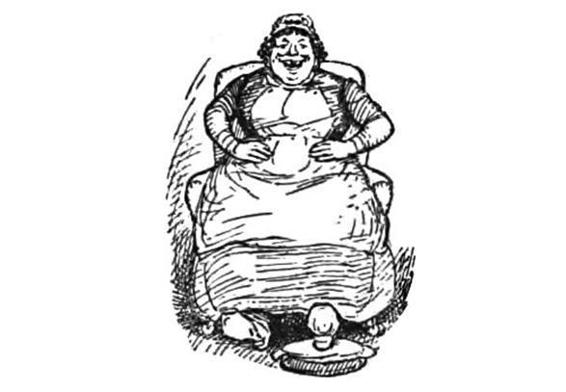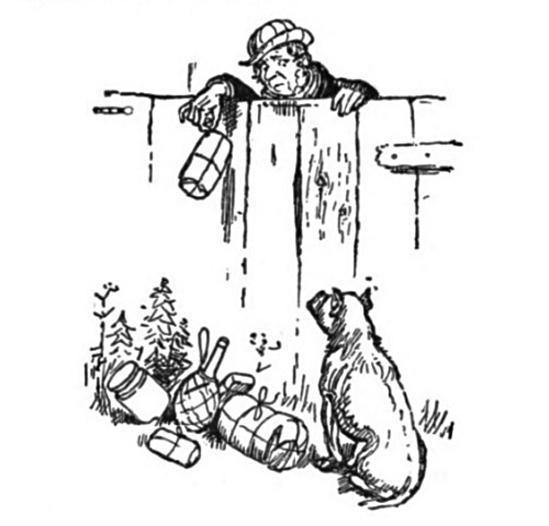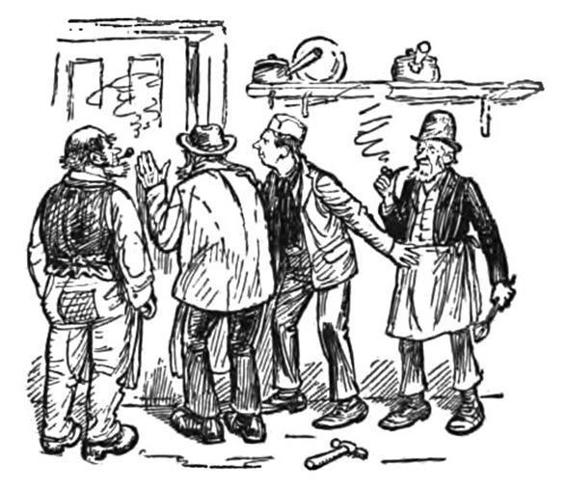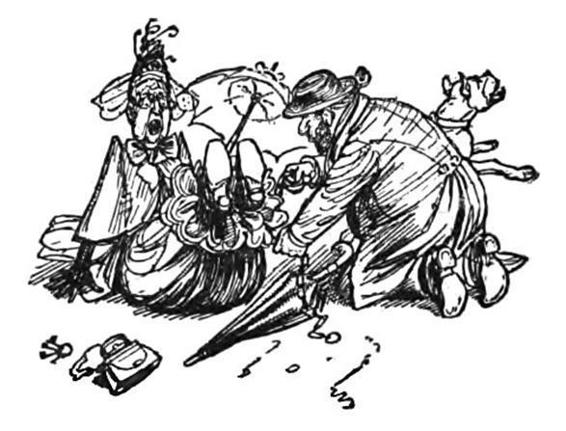Delphi Complete Works of Jerome K. Jerome (Illustrated) (Series Four) (389 page)
Read Delphi Complete Works of Jerome K. Jerome (Illustrated) (Series Four) Online
Authors: Jerome K. Jerome

The next morning we complained to our landlady of her carelessness in leaving wild beasts about the place, and we gave her a brief if not exactly truthful, history of the business.
Instead of the tender womanly sympathy we had expected, the old lady sat down in the easy chair and burst out laughing.

“What! old Boozer,” she exclaimed, “you was afraid of old Boozer! Why, bless you, he wouldn’t hurt a worm! He ain’t got a tooth in his head, he ain’t; we has to feed him with a spoon; and I’m sure the way the cat chivies him about must be enough to make his life a burden to him. I expect he wanted you to nurse him; he’s used to being nursed.”
And that was the brute that had kept us sitting on a table, with our boots off, for over an hour on a chilly night!
Another bull-dog exhibition that occurs to me was one given by my uncle. He had had a bulldog — a young one — given to him by a friend. It was a grand dog, so his friend had told him; all it wanted was training — it had not been properly trained. My uncle did not profess to know much about the training of bull-dogs; but it seemed a simple enough matter, so he thanked the man, and took his prize home at the end of a rope.
“Have we got to live in the house with
this?
” asked my aunt, indignantly, coming in to the room about an hour after the dog’s advent, followed by the quadruped himself, wearing an idiotically self-satisfied air.
“That!” exclaimed my uncle, in astonishment; “why, it’s a splendid dog. His father was honourably mentioned only last year at the Aquarium.”
“Ah, well, all I can say is, that his son isn’t going the way to get honourably mentioned in this neighbourhood,” replied my aunt, with bitterness; “he’s just finished killing poor Mrs. McSlanger’s cat, if you want to know what he has been doing. And a pretty row there’ll be about it, too!”
“Can’t we hush it up?” said my uncle.
“Hush it up?” retorted my aunt. “If you’d heard the row, you wouldn’t sit there and talk like a fool. And if you’ll take my advice,” added my aunt, “you’ll set to work on this ‘training,’ or whatever it is, that has got to be done to the dog, before any human life is lost.”
My uncle was too busy to devote any time to the dog for the next day or so, and all that could be done was to keep the animal carefully confined to the house.
And a nice time we had with him! It was not that the animal was bad-hearted. He meant well — he tried to do his duty. What was wrong with him was that he was too hard-working. He wanted to do too much. He started with an exaggerated and totally erroneous notion of his duties and responsibilities. His idea was that he had been brought into the house for the purpose of preventing any living human soul from coming near it and of preventing any person who might by chance have managed to slip in from ever again leaving it.
We endeavoured to induce him to take a less exalted view of his position, but in vain. That was the conception he had formed in his own mind concerning his earthly task, and that conception he insisted on living up to with, what appeared to us to be, unnecessary conscientiousness.

He so effectually frightened away all the trades-people, that they at last refused to enter the gate. All that they would do was to bring their goods and drop them over the fence into the front garden, from where we had to go and fetch them as we wanted them.
“I wish you’d run into the garden,” my aunt would say to me — I was stopping with them at the time—”and see if you can find any sugar; I think there’s some under the big rose-bush. If not, you’d better go to Jones’ and order some.”
And on the cook’s inquiring what she should get ready for lunch, my aunt would say:
“Well, I’m sure, Jane, I hardly know. What have we? Are there any chops in the garden, or was it a bit of steak that I noticed on the lawn?”
On the second afternoon the plumbers came to do a little job to the kitchen boiler. The dog, being engaged at the time in the front of the house, driving away the postman, did not notice their arrival. He was broken-hearted at finding them there when he got downstairs, and evidently blamed himself most bitterly. Still, there they were, all owing to his carelessness, and the only thing to be done now was to see that they did not escape.

There were three plumbers (it always takes three plumbers to do a job; the first man comes on ahead to tell you that the second man will be there soon, the second man comes to say that he can’t stop, and the third man follows to ask if the first man has been there); and that faithful, dumb animal kept them pinned up in the kitchen — fancy wanting to keep plumbers in a house longer than is absolutely necessary! — for five hours, until my uncle came home; and the bill ran: “Self and two men engaged six hours, repairing boiler-tap, 18s.; material, 2d.; total 18s. 2d.”
He took a dislike to the cook from the very first. We did not blame him for this. She was a disagreeable old woman, and we did not think much of her ourselves. But when it came to keeping her out of the kitchen, so that she could not do her work, and my aunt and uncle had to cook the dinner themselves, assisted by the housemaid — a willing-enough girl, but necessarily inexperienced — we felt that the woman was being subject to persecution.
My uncle, after this, decided that the dog’s training must be no longer neglected. The man next door but one always talked as if he knew a lot about sporting matters, and to him my uncle went for advice as to how to set about it.
“Oh, yes,” said the man, cheerfully, “very simple thing, training a bull-dog. Wants patience, that’s all.”
“Oh, that will be all right,” said my uncle; “it can’t want much more than living in the same house with him before he’s trained does. How do you start?”
“Well, I’ll tell you,” said next-door-but-one. “You take him up into a room where there’s not much furniture, and you shut the door and bolt it.”
“I see,” said my uncle.
“Then you place him on the floor in the middle of the room, and you go down on your knees in front of him, and begin to irritate him.”
“Oh!”
“Yes — and you go on irritating him until you have made him quite savage.”
“Which, from what I know of the dog, won’t take long,” observed my uncle thoughtfully.
“So much the better. The moment he gets savage he will fly at you.”
My uncle agreed that the idea seemed plausible.
“He will fly at your throat,” continued the next-door-but-one man, “and this is where you will have to be careful.
As
he springs toward you, and
before
he gets hold of you, you must hit him a fair straight blow on his nose, and knock him down.”
“Yes, I see what you mean.”
“Quite so — well, the moment you have knocked him down, he will jump up and go for you again. You must knock him down again; and you must keep on doing this, until the dog is thoroughly cowed and exhausted. Once he is thoroughly cowed, the thing’s done — dog’s as gentle as a lamb after that.”
“Oh!” says my uncle, rising from his chair, “you think that a good way, do you?”
“Certainly,” replied the next-door-but-one man; “it never fails.”
“Oh! I wasn’t doubting it,” said my uncle; “only it’s just occurred to me that as you understand the knack of these things, perhaps
you’d
like to come in and try
your
hand on the dog? We can give you a room quite to yourselves; and I’ll undertake that nobody comes near to interfere with you. And if — if,” continued my uncle, with that kindly thoughtfulness which ever distinguished his treatment of others, “
if
, by any chance, you should miss hitting the dog at the proper critical moment, or, if
you
should get cowed and exhausted first, instead of the dog — why, I shall only be too pleased to take the whole burden of the funeral expenses on my own shoulders; and I hope you know me well enough to feel sure that the arrangements will be tasteful, and, at the same time, unostentatious!”
And out my uncle walked.
We next consulted the butcher, who agreed that the prize-ring method was absurd, especially when recommended to a short-winded, elderly family man, and who recommended, instead, plenty of out-door exercise for the dog, under my uncle’s strict supervision and control.
“Get a fairly long chain for him,” said the butcher, “and take him out for a good stiff run every evening. Never let him get away from you; make him mind you, and bring him home always thoroughly exhausted. You stick to that for a month or two, regular, and you’ll have him like a little child.”
“Um! — seems to me that I’m going to get more training over this job than anybody else,” muttered my uncle, as he thanked the man and left the shop; “but I suppose it’s got to be done. Wish I’d never had the d — – dog now!”
So, religiously, every evening, my uncle would fasten a long chain to that poor dog, and drag him away from his happy home with the idea of exhausting him; and the dog would come back as fresh as paint, my uncle behind him, panting and clamouring for brandy.
My uncle said he should never have dreamed there could have been such stirring times in this prosaic nineteenth century as he had, training that dog.
Oh, the wild, wild scamperings over the breezy common — the dog trying to catch a swallow, and my uncle, unable to hold him back, following at the other end of the chain!
Oh, the merry frolics in the fields, when the dog wanted to kill a cow, and the cow wanted to kill the dog, and they each dodged round my uncle, trying to do it!

And, oh, the pleasant chats with the old ladies when the dog wound the chain into a knot around their legs, and upset them, and my uncle had to sit down in the road beside them, and untie them before they could get up again!
But a crisis came at last. It was a Saturday afternoon — uncle being exercised by dog in usual way — nervous children playing in road, see dog, scream, and run — playful young dog thinks it a game, jerks chain out of uncle’s grasp, and flies after them — uncle flies after dog, calling it names — fond parent in front garden, seeing beloved children chased by savage dog, followed by careless owner, flies after uncle, calling
him
names — householders come to doors and cry, “Shame!” — also throw things at dog — things don’t hit dog, hit uncle — things that don’t hit uncle, hit fond parent — through the village and up the hill, over the bridge and round by the green — grand run, mile and a half without a break! Children sink exhausted — dog gambols up among them — children go into fits — fond parent and uncle come up together, both breathless.